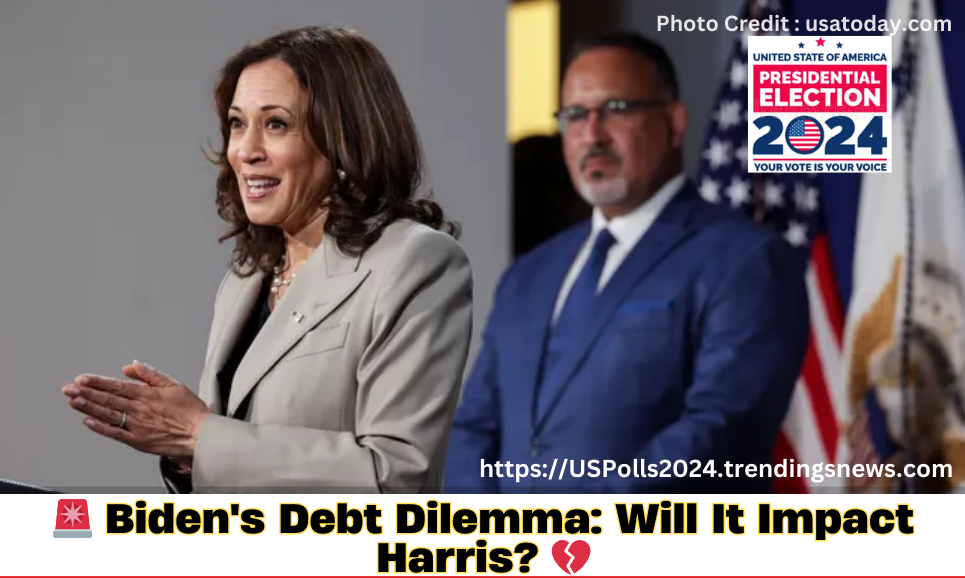As the election draws closer, President Biden’s student debt agenda faces substantial obstacles. For millions of Americans burdened by student loans, the first week of October brought distressing news.
With the end of a yearlong grace period and the halting of critical support programs, borrowers are now left to confront an uncertain financial future.
This situation leads to a pressing question: Biden’s Student Debt Crisis: Impact on Harris’ Future?
The Current State of Biden’s Student Debt Agenda
Legal Challenges and Program Interruptions
October marked a significant turning point in the landscape of student loans.
A federal judge in Missouri issued a temporary block on Biden’s broader student loan relief initiative, commonly referred to as “Plan B.”
This plan was intended to assist millions of borrowers following the Supreme Court’s rejection of Biden’s earlier proposal.
As legal hurdles accumulate, the federal student loan system has become more chaotic, raising concerns just weeks before the election.
With the grace period ending, borrowers must now resume payments, facing a reality many have not had to confront for years.
Preston Cooper, a senior fellow at the American Enterprise Institute, encapsulated the grim situation: “If you’re holding your breath, you’re going to have to do that for a long time.”
This reality casts a shadow over the administration’s previous efforts and raises questions about the political fallout for Vice President Harris as she campaigns.
The Implications for Borrowers
The expiration of the grace period means that millions of borrowers must now manage their loan payments amidst increasing financial strain.
The dual setbacks of halted programs and contradictory court rulings have left many in a state of uncertainty, grappling with how to navigate their obligations.
The potential impact on their financial stability is significant and immediate.
Strategies for Relief Amidst Legal Turmoil
Smaller Scale Reforms
Despite the legal setbacks, not all avenues for relief have been blocked.
Some smaller-scale reforms, such as changes to bankruptcy guidelines for student loans and expanded “borrower defense” claims for those misled by their colleges, remain viable options.
While these measures may not provide sweeping relief, they do offer hope to borrowers struggling to find their footing.
These initiatives signal a willingness to provide support, even if it comes in smaller doses.
The administration’s continued efforts in these areas may help alleviate some of the financial burdens faced by borrowers.
The SAVE Program
Biden’s new income-driven repayment plan, known as Saving on a Valuable Education (SAVE), was initially perceived as a lifeline for those burdened by student debt.
It promised more manageable repayment options, attracting significant attention from borrowers.
However, ongoing legal challenges have put the implementation of the SAVE program on hold, leaving many uncertain about their options moving forward.
Education Secretary Miguel Cardona has expressed frustration over the politically motivated lawsuits that hinder progress.
He has characterized these legal challenges as detrimental to millions of borrowers who need assistance.
“It’s shameful that elected officials are blocking help for those in need,” he remarked.
The Political Fallout: Will Harris Be Affected?
Voter Perception and Biden’s Legacy
The implications of Biden’s Student Debt Crisis: Impact on Harris’ Future extend beyond individual borrowers and into the broader political landscape.
While student loan forgiveness may not rank as the highest priority for voters, research indicates that supporting debt cancellation can be beneficial for Democrats politically.
However, the chaotic state of Biden’s student debt agenda raises concerns about its impact on Harris’s campaign.
Despite criticism from opponents, including former President Trump, many Americans may not place the blame solely on Biden for the ongoing challenges.
A study from Duke University suggests that public opinion is more nuanced; many attribute the dysfunction in the student loan system to a variety of factors rather than targeting Biden directly.
Harris’ Position in the Landscape
As Vice President Harris navigates the political implications of Biden’s student debt crisis, her position is critical.
While she may bear some of the political consequences, studies indicate that Biden is likely to receive less blame than anticipated.
Polling shows that the public views the situation through a broader lens, considering the roles of colleges, servicers, and courts in creating the current mess.
According to Mallory SoRelle, an assistant professor at Duke, “Our results suggest that this situation should not present a huge political cost for Biden or Harris.”
This finding indicates that while the challenges are significant, the fallout may not be as severe as initially feared.
Navigating the Future: What Lies Ahead?
Uncertainty for Borrowers
As borrowers await clarity regarding their options, advocates and legal experts are expressing frustration over the lack of clear guidance.
Many are left feeling lost, uncertain about their next steps in a system that is supposed to provide support.
“It’s a very frustrating time for everyone involved,” said Ed Boltz, a bankruptcy lawyer and advisor to the Education Department.
The Need for Clear Communication
In light of the rising anxiety among borrowers, the Biden administration must prioritize clear communication.
Providing guidance on available options and the future of student loan relief is crucial in restoring trust and confidence in the system.
Transparency will be key in reassuring borrowers and helping them navigate their financial responsibilities.
The Broader Economic Landscape: Social Security Benefit Cuts
In addition to the turmoil surrounding student loans, another pressing issue looms: potential cuts to Social Security benefits.
As the government navigates economic challenges, the possibility of reduced Social Security payments could have serious implications for millions of Americans already facing financial strain.
The specter of Social Security cuts may further complicate the situation for borrowers grappling with student debt.
Many younger Americans view Social Security as an integral part of their long-term financial planning, and cuts could exacerbate their economic vulnerabilities.
This connection between student debt and Social Security benefits underscores the urgency of addressing both issues.
The Connection Between Student Debt and Social Security
The interplay between Biden’s Student Debt Crisis: Impact on Harris’ Future and the threat of Social Security cuts is particularly relevant for younger voters.
Many are already feeling the pinch of student loans, and any reductions in Social Security could leave them in a precarious situation.
Addressing these concerns will be essential for Harris and the administration as they seek to reassure and engage voters.
The Road Ahead for Biden and Harris
The Challenge of Public Perception
As the Biden administration confronts the complexities of its student debt crisis, the implications for Harris become increasingly significant.
The political fallout remains uncertain, but nuanced public sentiment may offer some leeway.
The administration must act swiftly to tackle ongoing challenges and provide clarity to those in need.
The Importance of Action
To effectively address Biden’s Student Debt Crisis: Impact on Harris’ Future, the administration needs to adopt a proactive approach.
By showing commitment to finding solutions for those burdened by student loans, Biden and Harris can bolster their standing with key voter demographics, including young people and those experiencing financial hardship.
Taking decisive action can demonstrate their dedication to safeguarding financial security for all Americans.
This proactive stance may mitigate some of the negative consequences arising from ongoing challenges and reinforce their appeal as advocates for change.
Conclusion: A Multi-Faceted Challenge
As the Biden administration continues to navigate its student debt crisis, the implications for Harris are significant.
While she may inherit some political consequences, research suggests that Biden is likely to receive the least blame for the current state of affairs.
However, the challenges of the student loan system and potential Social Security cuts create a complex landscape that could influence the upcoming election.
Ultimately, the intersection of Biden’s Student Debt Crisis: Impact on Harris’ Future and the looming threat of Social Security cuts presents a unique set of challenges for the Democratic ticket.
Both issues have the potential to sway voter sentiment and impact election outcomes, making it essential for the administration to act decisively and transparently in addressing these critical concerns.

